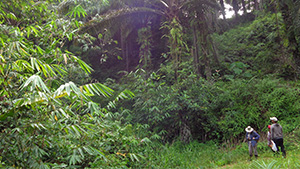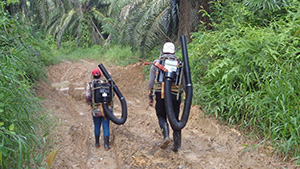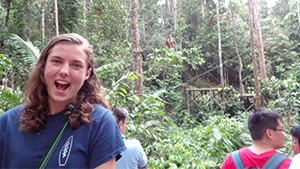Hannah Drumm - Maylasian Borneo
Hannah Drumm - Maylasian Borneo
This summer, with the help of STAR and the International Externship Committee, I had the wonderful opportunity to conduct a six week field project in Sarawak, Malaysia on the island of Borneo. I am interested in one health, particularly wildlife and disease spillover, and Borneo is undergoing widespread deforestation due to conversion to palm oil plantations. In Sarawak, there have been recent cases of dengue hemorrhagic fever in humans resulting from the sylvatic (that is virus that circulates within non-human hosts in the forest) dengue virus. Therefore, my research project looked at how the transition from a forest environment to palm oil plantation affects vectors and hosts of sylvatic dengue and if it could be a driver of disease spillover.
I knew I wanted to spend my summer overseas working with wildlife and vector borne disease. I had previous research experience but I had not yet had the opportunity to work on a field project. This summer showed me that I truly love international field work. I learned that days never go quite as planned and that flexibility is key. From having equipment break, run-ins with some of the forest’s more venomous inhabitants, to the truck’s starter going bad miles into a palm oil planation, I learned that one needs to be prepared and always keep a positive attitude. Our many misadventures brought our team closer and resulted in good friendships.
Setting up this project, I learned that international work is highly collaborative. I had Dr. Lark Coffey supporting me from UC Davis as my STAR mentor, Dr. Kathy Hanley from New Mexico State University who helped me prepare for the international component of my trip and allowed me to join her lab’s project in Malaysia, Dr. David Perera who acted as my in country mentor and provided me with a lab space at the Universiti Malaysia Sarawak (UNIMAS), and last but certainly not least PhD student Katie Young who not only trained me in the field but allowed me to live with her and her family for the duration of my stay. We had two fabulous field techs, Miko and Anita. They always had a good sense of humor and we spent our many hours together laughing as we sweated our way through the jungle.
We would start our day early in the morning, driving several hours to various palm oil plantations and then as far into the plantations as the roads would allow. Hiking on foot, we followed our GPS to randomly selected points in the palm oil and surrounding jungle where our sampling occurred. As there were no good maps of the plantations and no trails through the forest, we would often have to circumnavigate obstacles such as washed out roads, rivers, and cliffs. Cutting our way through the jungle down steep, slippery terrain with fifty pound vacuums on our backs was the adventure of a lifetime.
Malaysian Borneo has a melting pot culture and the food was fantastic. I was lucky enough to be in the country for Hari Raya (a celebration at the end of Ramadan) and several colleagues from the lab at UNIMAS invited us to their homes for the holiday. I was also able to explore Sarawak’s national parks and beautiful beaches. Getting to see Borneo’s amazing wildlife first hand was incredible. This summer was unforgettable and I would like to thank everyone who made this trip possible, terima kasih!



